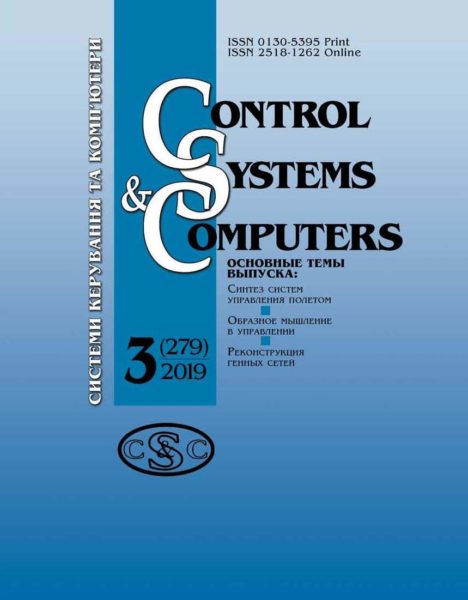Control Systems and Computers, N3, 2020, Article 3
https://doi.org/10.15407/csc.2020.03.028
Control Systems and Computers, 2020, Issue 3 (287), pp. 28-39.
UDK 007:330.341
V.Yu. Meytus, Doctor Phys.-Math., Researcher Associate, Department Head, Department virtual systems, International Research and Training Centre of Information Technologies and Systems of the NAS and MES of Ukraine, Acad. Glushkov ave., 40, Kyiv, 03187, Ukraine, vmeitus@gmail.com,
A.I. Morozova, Chief engineer-programmer, Department virtual systems, International Research and Training Centre of Information Technologies and Systems of the NAS and MES of Ukraine, Acad. Glushkov ave., 40, Kyiv, 03187, Ukraine, dep190@irtc.org.ua
L.Yu.Taran, Chief engineer-programmer, Department virtual systems, International Research and Training Centre of Information Technologies and Systems of the NAS and MES of Ukraine, Acad. Glushkov ave., 40, Kyiv, 03187, Ukraine, dep190@irtc.org.ua,
V.P. Kozlova, Research Associate, Department virtual systems, International Research and Training Centre of Information Technologies and Systems of the NAS and MES of Ukraine, Acad. Glushkov ave., 40, Kyiv, 03187, Ukraine, dep190@irtc.org.ua,
N.V. Maidaniuk, Junior Research, Department virtual systems, International Research and Training Centre of Information Technologies and Systems of the NAS and ME S of Ukraine, Acad. Glushkov ave., 40, Kyiv, 03187, Ukraine, n.maydanyuk@ukr.net
Digital Economy and Digital Twins. Main Research Area
The work is devoted to the consideration and research of methods for transforming economic structures that underlie the transition to the dominant digital task of economic processes and their relationship with digital forms of representing economic relations. The main stages of the possible assignment of enterprises and the levels of building digital twins have been determined. Using the example of an object that belongs to the external area of the enterprise – the supplier of the constituent components of the product – it is shown how the transition to the digital form of this object can be built.
Download full text! (In English)
Keywords: digital economy, digital enterprise, digital twin, information model, knowledge, levels of digital transformation.
- Bell, D., 2004. The coming post-industrial society. Social forecasting experience. Per. from English M .: Academia, 788 p. (In Russian).
- Schwab, K., 2017. The fourth industrial revolution. Per. from English M .: Publishing house “E”, 208 p. (In Russian).
- Gritsenko, I., Bazan, L.I., Yershova, O.L., 2019. “Cyber physical system – distributed system of intelligent control”. Upravlausie sistemy i masiny, 2, pp. 3-15. (In Russian).
https://doi.org/10.15407/usim.2019.02.003 - What is the digital economy? Trends, competencies, measurement. Dokl. to XX Apr. int. scientific. conf. on the problems of economic and social development, Moscow, 9–12 Apr., 2019. G. I. Abdrakhmanova, K. O. Vishnevsky, L. M. Gokhberg et al. Moscow: Izd. House of Higher School of Economics, 2019, 82 p. (In Russian).
- Tatarinova, S.S., 2017. “Digital Economy and Law: New Challenges – New Prospects”. Legal Bulletin of Samara University, 3(3), pp.62 – 22. (In Russian).
- Gartner Glossary, [online]. Available at: <https://www.gartner.com/it-glossary/digital-twin> [Accessed 20 Feb. 2020].
- Immerman, The Evolution of Digital Twin – and How Emerging Tech Is Driving Adoption, [online]. Available at: <https://www.ptc.com/en/product-lifecycle-report/digital-twin-technologies-driving-adoption> [Accessed 06 Feb. 2020].
- Kurganova, N.V., Filin, M.A., Chernyaev, D.S., Shaklein, A.G., Namiot, D.E., 2019. “Introduction of digital twins as one of the key directions of production digitalization”. International Journal of Open Information Technologies, 7 (5), pp. 105-115. (In Russian).
- Digital twin, [online]. Available at: <https://www.it.ua/ru/knowledge- base / technology-innovation / cifrovoj-dvojnik-digital-twin]. (In Russian).
- Technology of digital twins. [Electron. resource: https://future2day.ru/texnologiya-cifrovyx-dvojnikov/> [Accessed 15 Feb. 2020] (In Russian).
- Meytus, V.Y., “Problems of Constructing Intelligent Systems. Systems. Levels of Intelligence”. Cybernetics and Systems Analysis, 54 (4), pp.541-551.
https://doi.org/10.1007/s10559-018-0055-7 - Meytus, V.Y., “Problems of Constructing Intelligent Systems. Knowledge Representation”. Cybernetics and Systems Analysis, 55 (4), pp.521-530.
https://doi.org/10.1007/s10559-019-00160-5 - Meytus, V.Yu., Morozova, G.I., Taran, L.Yu., Kozlova, V.P., Maidaniuk, N.V., 2019. “Cyber-physical Systems as the Basis for the Intellectualization of “Smart” Enterprises”. Control Systems and Computers. 2019, 4, pp. 14-26. (In Ukrainian).
https://doi.org/10.15407/csc.2019.04.014 - Korablev, A.V.,2019. “Key functionality and benefits of using digital twins in industry”. Digital economy, 2 (6), pp. 5-11. (In Russian).
- Enterprise Economics: Textbook for universities. Ed. prof. V. Ya. Gorfinkel, prof. V.A. Shvandara. Moscow: UNITY-DANA, 2007.670 p. (In Russian).
Received 07.06.2020



